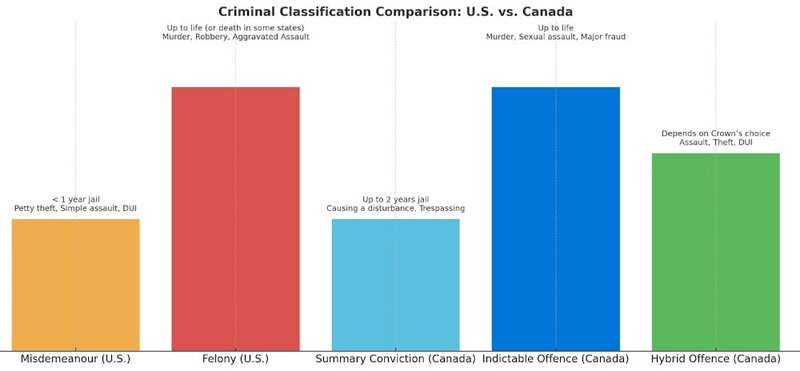“Clients frequently ask us whether they’ve been charged with a felony or a misdemeanour offence,”
says criminal defence lawyer
Robbie Tsang
, a founding partner of the Greater Toronto Area’s Mass Tsang LLP.
“They’re not familiar with the ‘indictable,’ ‘summary conviction,’ and ‘hybrid’ offence terms used by the Canadian criminal justice system and likely picked up the other terms from U.S. television crime dramas. We can usually explain to them that they’ve been charged with a felony or misdemeanour equivalent but typically don’t spend much time educating them about the differences between U.S. and Canadian crime classifications.”
Founding Mass Tsang partner
Jeff Mass
says,
“We do try to educate them about the implications of their specific charges and how the indictable or summary conviction classification might impact them if they are convicted. If they’ve been charged with an indictable offence, it’s like being charged with a felony in America, and carries similar severe penalties, including potentially long prison terms, but at least no threat of a death sentence.”
With the firm’s blog dedicated to educating the public and potential clients about criminal law, now might be a good time to explain what differentiates a felony from a misdemeanour. While we trust that our readers will not run afoul of the law here or in the U.S., the more one knows about criminal law, the better prepared one can be if they become embroiled in it. We can also use this topic to provide better clarity about Canadian crime classifications.
The Difference Between Misdemeanours and Felonies
U.S. states generally categorize criminal offences as either misdemeanours or felonies. Misdemeanours are lower-level criminal offences that result in relatively minor penalties upon conviction.
Common misdemeanour offences include:
-
Disorderly conduct
-
Trespassing
-
Vandalism
-
Petty theft
-
Shoplifting
-
Simple Assault
-
Small-scale drug possession
-
DUI
If you’re convicted of a misdemeanour in the States, the most severe punishment you might face is up to a year in the local or county jail and a fine of up to a few thousand dollars. Most people convicted of misdemeanours receive a short (a few days to a month) or suspended jail term and are sentenced to probation, community service, and a fine. Depending on the state, some misdemeanours do not result in a permanent criminal record, and record expungement is far easier to secure with a misdemeanour than a felony.
Felony crimes are much more severe offences that carry much harsher penalties if convicted, including likely incarceration and significant fines.
Common felony offences include:
-
Murder
-
Rape
-
Robbery
-
Burglary
-
Grand theft
-
Carjacking
-
kidnapping
-
Drug trafficking
-
Aggravated assault
-
DUI causing death or injury

Most U.S. courts that convict offenders of felonies sentence them to prison terms of between one year and life, depending on the severity of the crime, sentencing guidelines, and judicial tendencies. Those convicted of felonies face significant fines, which can be as high as $100,000 in some states and up to $250,000 for a federal felony conviction. They also face loss of voting rights, firearms restrictions, ineligibility to work in certain professions, and a permanent criminal record, depending on the offence and state. Last, certain felony convictions — especially for murder — can lead to the death sentence.
That said, a felony conviction doesn’t automatically result in a prison sentence, as state judges typically have leeway to suspend sentences handed down for certain lower-level, non-violent felony offences based on a variety of parameters, such as causing limited harm, offering restitution, being a first-time offender, and having good standing in the community, to name a few.
Felony convictions in conservative states tend to generate longer prison sentences than in those with more liberal attitudes. Whereas a first-time armed carjacker in New York might receive a three- to five-year prison term, a Florida court would sentence the same offender to a mandatory minimum of 10 years, or up to 20.
Felony and Misdemeanour Classifications Vary by State
As you’ve undoubtedly surmised, felony and misdemeanour classifications vary by state, as do the punishments a court might hand down if convicted of either. What might be classified as a misdemeanour in one state might be a felony in another; a slap-on-the-wrist sentence in one state might be a mandatory 30-day jail term in another. And then there are federal felony and misdemeanour offences, which typically carry harsher penalties than their state equivalents, including incarceration without parole.
Of all states, Massachusetts has the clearest distinction between felony and misdemeanour offences. A felony is explicitly defined as any crime punishable by imprisonment in state prison, whereas a misdemeanour is any crime punishable by a fine and/or incarceration in a county house of correction.
Conversely, Florida differentiates felonies and misdemeanours by statute in its criminal code. It designates every offence as either a misdemeanour or felony, and the severity of the offence further delineates each into classes punished by corresponding sentencing guidelines, including mandatory minimum punishments.
Florida has one of the harshest criminal justice systems in the U.S., with strict sentencing guidelines, mandatory minimum prison terms for many felonies, and a judiciary known for taking a hard stance against criminal offenders. That said, Florida judges have some discretion to offer leniency to first-time, non-violent offenders who commit misdemeanours or low-level felonies, allowing for probation or diversion instead of incarceration.
If you are bound and determined to commit a felony or misdemeanour in the U.S.,
Jeff Mass
and
Robbie Tsang
lawyers recommend that you choose Minnesota, which has the lowest incarceration rate in America. With a rate of about 200 per 100,000 residents incarcerated being far below the national average rate of 450 per 100,000, the state’s criminal justice system encourages lenient sentencing for misdemeanours and felonies. It also limits judicial discretion to deviate from the lenient sentencing guidelines.
Comparing the U.S. and Canadian Criminal Categorizations
In Canada, a summary conviction offence is roughly equivalent to a U.S. misdemeanour, while an indictable offence is similar to a felony. Unlike the U.S., these classifications are established solely at the federal level and apply uniformly across the country. Canada also has a “hybrid” offence category, which allows Crown prosecutors to choose whether to charge an offender under indictment or the less severe summary conviction category. Some U.S. states have a similar categorization — commonly called “wobbler” — that allows prosecutors to opt for a felony or misdemeanour prosecution. For more on Canada’s criminal categorization, see our
April 2024 blog post
.
Secure a Skilled Defence Team in the GTA with Mass Tsang
While we can’t help you with a felony or misdemeanour, if you’ve been charged with an indictable or summary conviction offence in the Greater Toronto Area, the legal team at Mass Tsang are highly skilled at strategizing effective criminal defences. To learn how we can help you successfully resolve your
criminal charges
,
contact us for a free initial consultation
.







